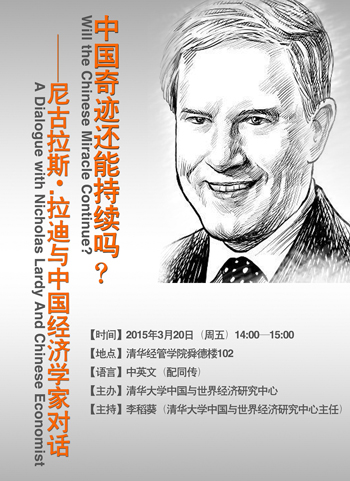Will the Chinese miracle continue? Dialogue with Nicolas Lardy and Chinese economists

Speaker Bio:
Nicholas R. Lardy is the Anthony M. Solomon Senior Fellow at the Peterson Institute for International Economics. He joined the Institute in March 2003 from the Brookings Institution, where he was a senior fellow from 1995 until 2003. Before Brookings, he served at the University of Washington, where he was the director of the Henry M. Jackson School of International Studies from 1991 to 1995. From 1997 through the spring of 2000, he was also the Frederick Frank Adjunct Professor of International Trade and Finance at the Yale University School of Management. He is an expert on the Chinese economy.
Lardy's most recent books are Markets over Mao: The Rise of Private Business in China (2014) and Sustaining China's Economic Growth after the Global Financial Crisis (2012). His previous books include The Future of China's Exchange Rate Policy (2009) (co-authored with Morris Goldstein), Integrating China into the Global Economy (2002), China’s Unfinished Economic Revolution (1998), China in the World Economy (1994), Foreign Trade and Economic Reform in China, 1978–1990 (1992); Agriculture in China’s Modern Economic Development (1983), and Economic Growth and Distribution in China (1978).
Lardy is a member of the Council on Foreign Relations and is a member of the editorial boards of Asia Policy and the China Review.
He received his BA from the University of Wisconsin in 1968 and his PhD from the University of Michigan in 1975, both in economics.
Event Recap:
Upon invitation, Nicholas Lardy, Senior Fellow of the Peterson Institute for International Economics, delivered a keynote speech at the Center for China in the World Economy at Tsinghua University, addressing the issues of consistency in China’s development. Drawing on his latest publication (Markets over Mao: The Rise of Private Business in China), Mr. Lardy shared his view on whether China could maintain a high speed of economic growth in a foreseeable future.
Mr. Lardy said that it was the private enterprises that drove China’s economy forward these years, especially in industrial sector. In comparison with their state-own counterparts, private companies have higher rate of capital investment. Some say that China’s economy is still driven by state-own enterprise as government rules supreme in this country but Mr. Lardy believes that if market could start playing decisive role in allocating resource while all forms of monopoly power could be eliminated, as agreed in the Communiqué of the Third Plenary Session of the 18th Central Committee of the CPC, China could maintain a high speed of growth. He suggested that China should throw telecommunication, private bank, private capital management and insurance industry into market to boost competition. On the one hand, rate of capital return shall pick up for private sector and on the other hand, efficiency in state-own enterprises will also increase.
After the speech, Mr. Lardy exchanged his view with Chinese economists on ratio of social-cost benefit/financial returns of state-own enterprises, level of government’s intervention in economic activities as well as issue of supply and demand in marco-economy. He believes we should assess all enterprises according to the same standard – whether they are highly efficient in allocating scarce resources.
Nicholas R. Lardy is the Anthony M. Solomon Senior Fellow at the Peterson Institute for International Economics. He joined the Institute in March 2003 from the Brookings Institution where he was a senior fellow from 1995 until 2003. Before Brookings, he served at the University of Washington where he was director of the Henry M. Jackson School of International Studies from 1991 to 1995. Lardy is an expert on the Chinese economy, he received his BA form the University of Wisconsin in 1968 and his PhD from the University of Michigan in 1975, both in economics.




